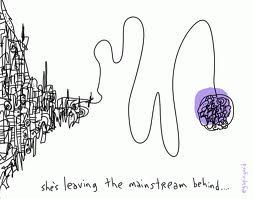
By Jodi Koslow Martin
One of the pleasures of reading a blog is to get to know its author. If you read consistently enough, you get a sense of who she is and seeing if her experiences align with yours. It’s been fun for those of us writing this blog to see what gets shared, what gets comments, and what gets people thinking.
To share a bit more about myself, I am coming up on finishing my first full year as a vice-president. There is a part of me that wants to write, “well, I work at a small school so it’s not a real vice-president position.” What? How about that for listening to nothing my co-bloggers have written so far? Then, there’s another part of me that wants to share with you that this year as a vice-president has been so different from every other year of my career. Vice presidents are the people I used to talk about…all the time. I used to analyze what they thought, what they did, what they said, what I thought they believed. Ugh. How is it possible that anyone would care to give serious thought to what I think? Who am I? And again…am I even reading this blog? But, then, I think again. I’ve worked towards this position and I’m proud to have it. Right?!?! Damn straight. The job fits my skill set and my love for higher education. I often think using the word “passion” for working with college students is overused; I, on the other hand, have a love for higher ed. I believe in it for its transformational power and am committed to it in spite its imperfections. Look at that. I’m in a committed relationship with higher education.
My friend, Jennifer Keup, recently posted her review of the book, Composing a Life. I love the idea of “composing a life.” We are all composing our lives. As we think about composing our careers in higher education, we may find that we thread together a bunch of experiences (and sew them up into a neat resume) and discover where we make the greatest of contributions in higher education. I’m finding that leadership in higher education comes together in large parts in the meetings we have, in the tones of our voices, and in making appearances. In Composing a Life, Bateson spends some time reflecting upon an instance where someone mentioned the pastoral role of an academic dean. Her colleague was referring to the listening, consoling, counseling, and ministering parts of leadership rather than to a bucolic way of living life. One day after I read this section, a colleague of mine offered me advice to try to be more pastoral with staff. Working on a Christian campus, being pastoral is something many are familiar with. The term “pastoral” struck me, admittedly not in a positive way at first. Yet, it resonated with me how Bateson managed to put the pastoral comment in context; she offered that being nurturing can include both concurring and agreeing with someone as well as offering a realistic version of the truth. She’s spot on. I’m continually striking the balance to sit next to someone and listen intently and quietly with clearly laying out my expectations and vision.
All of this is part of my reflection — a year into this job as vp — of my continual journey to be an authentic leader. I’ve mentioned authenticity a few times in past blogs and I still connect with the concept. It’s only in being most genuine do I find that people can trust you. Just last week, I made a new hire. I always begin interviews with candidates who will be direct reports with breakfast and then end the day with the candidate to assess what she or he has learned. One candidate recently told me at the end of the day, “So…you’re different.” Yes I am. There is only one way for me to be VP and it’s as me. I know no other way. I have to keep that in mind. And, I like being different. So much so that I hired the person who noticed.









